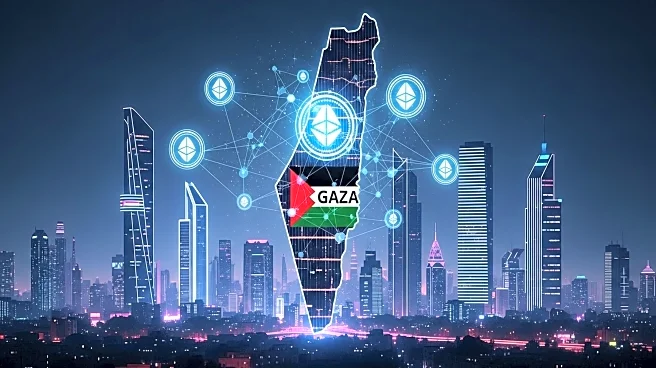What's Happening?
President Trump has unveiled the Gaza Blockchain Riviera project, officially known as the Gaza Reconstitution, Economic Acceleration and Transformation Trust (GREAT Trust). This initiative aims to leverage blockchain and AI technologies to tokenize land rights and develop AI-powered smart cities in Gaza. The project promises significant economic potential by attracting global investment through decentralized finance platforms. However, it faces ethical, legal, and geopolitical challenges, with critics labeling it as 'disaster capitalism' due to concerns over mass displacement and violations of Palestinian sovereignty. Arab nations and European powers have expressed opposition, citing risks to regional stability.
Why It's Important?
The project represents a significant shift in post-conflict urban development, potentially unlocking $100 billion in investment through fractional ownership models. It could serve as a template for AI-powered smart cities in other post-conflict zones, offering a replicable model for global adoption. However, the initiative's success depends on navigating complex ethical, legal, and regulatory challenges. Critics argue that it exploits conflict for profit, raising concerns about displacement and sovereignty violations. The geopolitical tensions surrounding the project could impact investor confidence and token adoption, highlighting the risks of operating in a contested region.
What's Next?
The project's viability hinges on resolving regulatory and geopolitical challenges. It must adopt inclusive governance frameworks, align with international law, and prioritize community engagement to succeed. The absence of clear regulatory frameworks in Gaza increases the risk of speculative bubbles and governance erosion. Investors must weigh the potential high returns against the moral costs and geopolitical risks. The initiative could either redefine post-conflict recovery or become a cautionary tale of technological hubris.
Beyond the Headlines
The project highlights the divergent trajectories of blockchain adoption in stable versus conflict-affected regions. It underscores the dual-edged nature of blockchain and AI in post-conflict zones, offering opportunities for decentralized governance and economic revitalization while posing ethical and legal challenges. The initiative's reliance on private funding, avoiding U.S. taxpayer money, does not mitigate accusations of profiting from displacement.










